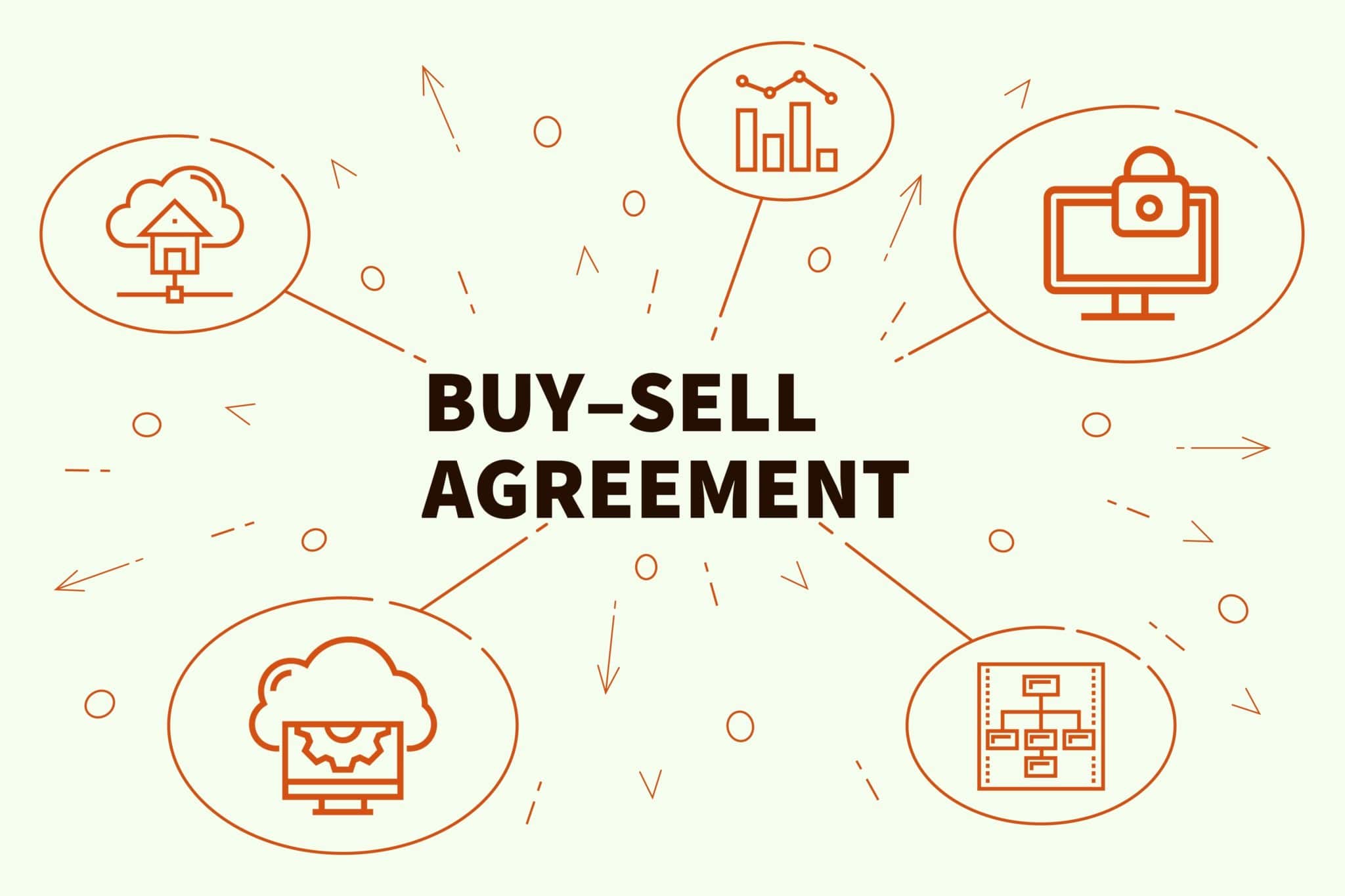Buy-sell agreements are contracts that not only help business partners manage difficult situations, but also help protect one’s business, as well as personal and family interests. Simply put, these agreements can successfully protect a company’s longevity. For example, when an important member of the company leaves, it is crucial to have a detailed process that dictates how shareholders and partners should continue in the business.
Also known as a business prenup, business will, or buyout agreement, a buy-sell agreement is a contract that instructs exactly how a partner’s share of a business will be reallocated if the partner leaves the business for any reason. This legally binding agreement typically specifies that the available shares will be sold to the remaining partners—or to the partnership.
In addition to controlling business ownership, these agreements also develop a way to decide the value of a business. For example, if there is a dispute among the business owners regarding the specific value of the company or of a partner’s interest, the valuation methods within in the buy-sell agreement will be put into effect.
It is important to keep in mind that buy-sell agreements are not restricted to a partner’s death. On the contrary, there are several instances where a buy-sell agreement would become important. These include the following life events: employment termination, employment resignation, retirement, a permanent disability, death, divorce, or bankruptcy.
How Do Buy-Sell Agreements Function?
Sole proprietorships, partnerships, and corporations use buy-sell agreements in an effort to improve the transition in ownership when a partner dies, retires, or leaves the business.
It is common practice for these agreements to require that the business share be sold to the company or to the remaining members of the business—according to a fixed plan.
What are Cross-purchase and Redemption Agreements?
Cross-purchase and redemption agreements are the most common buy-sell agreements. Cross-purchase agreements stipulate that remaining owners can buy the interests of a deceased or selling owner, and
redemption agreements mandate that the business entity will buy the interests of the selling owner.
In a cross-purchase agreement, the remaining owners purchase the share of the business that is for sale. And in a redemption agreement, the business entity buys the share of the business. In some situations, partners will request a combination of the two—so that some parts will be available for purchase by individual partners, and the remainder can be bought by the partnership.
Business partners commonly purchase life insurance policies on other partners to guarantee that funds will be available if needed. In the event of a partner’s death, the proceeds from the policy can be used towards the purchase of the deceased’s business interest. A specific employee is usually designated as the buyer or successor when a sole proprietor dies.
In addition to cross-purchase and redemption agreements, there are several less-common types of buy-sell agreements. These include hybrid buy-sell agreements, company purchase agreements, and asset purchase agreements.
Hybrid buy-sell agreements (also called wait-and-see agreements) involve an option for shareholders and corporations to acquire shares after a triggering event. Company purchase agreements are vital for transferring the ownership of a business upon a trigger event, such as death or disability. Asset purchase agreements are needed when business transactions include the transfer of assets, such as property and equipment.
What is the Buy-Sell Agreement Process?
While the buy-sell agreement process can be complicated, there are several steps to be aware of:
Start your Nevada LLC in
24 hours guaranteed
You don’t need to live in Nevada to enjoy the best asset protection
and audit defense a Nevada LLC can provide.
–Verify which events lead to a triggered buyout
–Determine who has rights and purchase obligations
–Figure out all of the names and address of purchasers
–Establish a purchase price or valuation with applicable discounts
–Discuss payment terms and intervals
–Establish and understand all of the consequences for not using purchase rights
–Come up with a mutually agreed upon valuation procedure
–Create an assignment of shares and how these shares will be distributed
How Do I Know if I Need a Buy-Sell Agreement?
Many business owners question whether they need a buy-sell agreement. Keep in mind that there are numerous advantages to using a buy-sell agreement—including the fact that they protect the rights and privileges of the business and all of its owners.
It is common for a business to use buy-sell agreements for the following reasons: to maintain business continuity, to protect company ownership, to lessen the possibility of disagreements, to ease stress, and to safeguard all business assets. While buy-sell agreements are not used on a daily basis, they provide detailed directions when specific events should occur within a business.
Who Should Draft a Buy-Sell Agreement?
Business owners/partners should work with an attorney and a certified public accountant (CPA) to draft, negotiate, and execute the terms of a buy-sell agreement. In addition, if you need specific legal advice, always speak with corporate lawyers licensed in your state, who are trained to provide you with personalized information. Partners should always retain their own counsel when entering into a buy-sell agreement.
Involving attorneys and CPAs can reduce the likelihood of mistakes when using a buy-sell agreement. In fact, common buy-sell agreement mistakes include failing to select the appropriate buy-sell agreement, identifying the wrong triggering events, using the wrong valuation methodology, and not managing funding issues before signing the agreement.
The bottom line is that every business owned by several individuals should have a buy-sell agreement in place. This is important for establishing an exit plan for those who have a stake in the business, as well as setting fair value for an individual’s share in the company. At NCH, we have a team of business specialists that can help you design a buy-sell agreement to meet your specific needs. Call us at 1-800-508-1729 to learn more!







